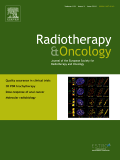
RADIOTHERAPY AND ONCOLOGY
Scope & Guideline
Shaping the future of cancer treatment through peer-reviewed excellence.
Introduction
Aims and Scopes
- Clinical Radiotherapy Techniques:
The journal publishes studies on various radiotherapy techniques, including intensity-modulated radiotherapy (IMRT), stereotactic body radiotherapy (SBRT), and brachytherapy. Research in this area focuses on optimizing treatment plans, improving delivery methods, and assessing patient outcomes. - Radiobiology and Treatment Response:
It covers the biological effects of radiation on cancer cells and surrounding tissues. This includes studies on dose-response relationships, mechanisms of radioresistance, and the role of biomarkers in predicting treatment efficacy. - Technological Innovations in Radiotherapy:
The journal highlights advancements in radiotherapy technology, such as MR-guided therapy, artificial intelligence applications in treatment planning, and the development of new imaging techniques to improve accuracy and precision in radiation delivery. - Quality Assurance and Safety in Radiotherapy:
Research related to quality assurance processes, patient safety protocols, and the implementation of best practices in radiotherapy settings is a significant focus area, aiming to minimize errors and enhance treatment quality. - Patient-Reported Outcomes and Quality of Life:
The journal emphasizes the importance of patient-reported outcomes and quality of life assessments in cancer treatment. It aims to understand the impact of radiotherapy on patients' physical, emotional, and social well-being. - Palliative Care and Symptom Management:
It addresses the role of radiotherapy in palliative care settings, exploring its effectiveness in managing symptoms and improving the quality of life for patients with advanced cancer.
Trending and Emerging
- Artificial Intelligence in Radiotherapy:
There is a significant increase in research exploring the application of artificial intelligence (AI) in various aspects of radiotherapy, including treatment planning, image analysis, and patient-specific quality assurance. AI's potential to enhance precision and efficiency in radiation therapy is a major focus. - Personalized and Adaptive Radiotherapy:
Emerging studies emphasize the need for personalized treatment approaches, including adaptive radiotherapy that adjusts for anatomical changes over the course of treatment, aiming to optimize therapeutic outcomes and minimize toxicity. - Integration of Immunotherapy with Radiotherapy:
Research is increasingly focusing on the synergistic effects of combining immunotherapy with radiotherapy, investigating how these modalities can enhance treatment response and improve patient survival rates. - Longitudinal Patient-Reported Outcomes:
There is a growing emphasis on longitudinal studies assessing patient-reported outcomes (PROs) and quality of life, recognizing the importance of these metrics in evaluating the overall effectiveness of radiotherapy. - Radiomics and Biomarker Development:
The trend towards utilizing radiomics—extracting large amounts of features from medical images—and developing predictive biomarkers for treatment response is gaining momentum, with potential applications in personalized treatment strategies. - Sustainability and Cost-Effectiveness in Radiotherapy:
Emerging research focuses on the sustainability of radiotherapy practices and the economic evaluation of treatment strategies, aiming to balance efficacy with cost-effectiveness in healthcare delivery.
Declining or Waning
- Traditional Radiotherapy Techniques:
There has been a noticeable decline in studies focusing solely on conventional radiotherapy techniques, such as 2D planning and standard fractionation, as newer, more advanced methods gain traction in clinical practice. - Single-Agent Radiotherapy Studies:
Research that investigates the effects of radiotherapy as a standalone treatment has seen a decrease. There is a growing emphasis on combination therapies, particularly integrating radiotherapy with immunotherapy or targeted therapies. - Basic Radiobiological Studies:
While foundational research in radiobiology remains important, there is a shift towards more applied research that directly correlates with clinical outcomes, leading to a reduction in purely theoretical studies. - Generalized Quality Assurance Protocols:
The focus on generalized quality assurance protocols has waned in favor of more specific, customizable approaches tailored to individual patient needs and treatment plans.
Similar Journals
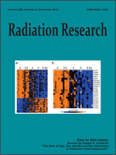
RADIATION RESEARCH
Innovative studies shaping the future of radiation science.RADIATION RESEARCH is a prestigious journal published by the RADIATION RESEARCH SOC that serves as a vital resource for professionals and researchers in the fields of biophysics, radiation science, and radiology. Established in 1954, this journal has consistently advanced the study of radiation's effects on health and the environment, bridging fundamental and applied research. It boasts an impressive impact factor reflected in its quartile rankings, including Q2 in Biophysics and Q1 in Radiation, making it a highly regarded publication within its discipline. Researchers will find valuable insights through rigorous peer-reviewed articles that explore innovative methodologies and findings related to radiation exposure, imaging technologies, and the biological consequences of radiation. Although the journal does not currently offer open access, it remains a vital reference for academia and industry, fostering a deeper understanding of radiation sciences and their implications for future research and public health.

International Journal of Radiation Research
Advancing Knowledge in Radiation ScienceThe International Journal of Radiation Research, published by the IJRR-IRANIAN JOURNAL RADIATION RES, serves as a critical platform for researchers and professionals in the fields of radiology, nuclear medicine, and imaging technology. Since its inception in 2003, this peer-reviewed, open-access journal has focused on disseminating significant findings and advancements, contributing to the global discourse on radiation research. With an ISSN of 2322-3243, the journal offers valuable insights into emerging technologies and methodologies, maintaining a commitment to enhancing the understanding and application of radiation in medical science. Although currently positioned in the Q4 category across its scopes, the journal strives to elevate its impact by promoting high-quality research and innovative practices. The journal is accessible to a wide audience and encourages submissions from scholars worldwide, directly supporting the advancement of knowledge in radiological and ultrasound technology. For those seeking to explore and contribute to this dynamic field, the International Journal of Radiation Research represents an invaluable resource.
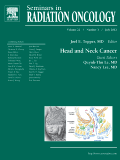
SEMINARS IN RADIATION ONCOLOGY
Exploring the Future of Radiation TherapySEMINARS IN RADIATION ONCOLOGY is a premier journal published by W B SAUNDERS CO-ELSEVIER INC, dedicated to advancing the field of radiation oncology through high-quality research and comprehensive reviews. With an impressive impact factor and a notable HIndex, this journal holds a prominent place within the academic community, particularly illustrated by its Q2 ranking in both Cancer Research and Oncology, and a Q1 ranking in Radiology, Nuclear Medicine, and Imaging as of 2023. Since its inception in 1991, the journal has served as a vital resource for researchers, clinicians, and healthcare professionals, facilitating the exchange of innovative ideas and practices that shape the future of cancer treatment. While the journal is not open access, it offers essential insights into the latest advancements in the field, catering to a diverse audience eager to expand their knowledge and improve patient outcomes in the realm of radiation therapy.
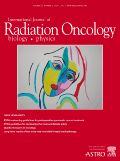
INTERNATIONAL JOURNAL OF RADIATION ONCOLOGY BIOLOGY PHYSICS
Advancing the Frontiers of Radiation Oncology.International Journal of Radiation Oncology Biology Physics, published by Elsevier Science Inc, is a premier academic journal that has played a critical role in advancing the field of radiation oncology since its inception in 1975. With an impressive impact factor and recognition as a Q1 journal across multiple categories such as Cancer Research, Oncology, and Radiology, this journal serves as a vital resource for researchers, clinicians, and students dedicated to understanding and improving cancer treatment modalities. Its multifaceted scope encompasses original research, reviews, and innovative clinical studies, fostering a deeper understanding of the interplay between radiation, biology, and oncology. With a remarkable ranking in Scopus, including a top position in Radiation Physics and an elite percentile in Oncology, IJROBP remains at the forefront of scientific discovery and innovation in the management of cancer. A traditional subscription model ensures high-quality, peer-reviewed content, providing invaluable insights that continue to advance the standards of care and research in radiation oncology.
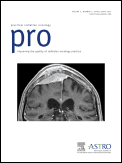
Practical Radiation Oncology
Unlocking Potential in Radiation MedicinePractical Radiation Oncology is a premier journal published by Elsevier Science Inc., focusing on the critically important fields of Oncology and Radiology, Nuclear Medicine, and Imaging. With an ISSN of 1879-8500, this journal serves as an essential resource for professionals and researchers dedicated to advancing the practice and research of radiation oncology. Established in 2011 and continuing through 2024, it has quickly gained recognition, achieving a prestigious Q2 ranking in Oncology and an exceptional Q1 ranking in Radiology, Nuclear Medicine, and Imaging as of 2023. The journal, housed in New York, USA, provides a platform for innovative research and practical insights, aimed at enhancing therapeutic practices and improving patient outcomes. As part of its commitment to fostering scientific dialogue, it also features a range of articles, reviews, and clinical studies that cater to the diverse interests of its readers. Hard-copy availability combined with digital access ensures a broad reach for the latest advancements in the field.
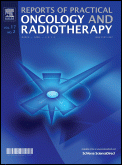
Reports of Practical Oncology and Radiotherapy
Championing transparency in cancer research dissemination.Reports of Practical Oncology and Radiotherapy is a distinguished open-access journal dedicated to advancing the fields of oncology, radiotherapy, and cancer research. Published by VIA MEDICA since 2001, this journal serves as a critical platform for disseminating innovative research and practical findings that impact clinical practices and patient outcomes. With an emphasis on fostering collaboration and knowledge exchange among researchers, clinicians, and students, the journal has positioned itself within the Q3 and Q4 categories of renowned directories in oncology, radiology, and nuclear medicine as of 2023. Based in Gdansk, Poland, it provides unrestricted access to its articles, ensuring that crucial research reaches a wide audience. This dedication to open access reflects the journal's commitment to transparency and innovation in the fight against cancer, making it an invaluable resource in this vital field of study.

Tumori Journal
Empowering Oncology Through Innovative Discoveries.Tumori Journal is a distinguished publication in the field of oncology, dedicated to advancing the understanding and treatment of cancer since its inception in 1946. Published by SAGE Publications Ltd, this Italian journal serves as a pivotal platform for researchers, clinicians, and academicians to disseminate cutting-edge findings in cancer research and related areas of medicine. With an impressive record of contributions spanning multiple decades, Tumori Journal aims to foster collaboration and dialogue among professionals in the oncology community. Although classified in the Q4 category for Cancer Research and the Q3 category for both Medicine (miscellaneous) and Oncology as of 2023, the journal continues to draw interest with its rigorous peer-review process and commitment to quality. Researchers are encouraged to explore innovative methodologies and share impactful clinical insights through the journal, which also ranks within the top tiers of Scopus metrics for oncology and cancer research domains. With a growing emphasis on accessible research, Tumori Journal remains an essential resource in the continuous fight against cancer.

Physics & Imaging in Radiation Oncology
Bridging Physics and Oncology for Enhanced Treatment OutcomesPhysics & Imaging in Radiation Oncology is a premier journal dedicated to advancing the interdisciplinary field of radiation oncology through innovative research and imaging technologies. Published by Elsevier, this open-access journal has made its mark since its inception in 2017, ensuring that groundbreaking findings are accessible to a broad audience. With a strong focus on the integration of physics, imaging techniques, and oncology, the journal occupies esteemed positions in the academic landscape, ranking in the top quartile for Radiation and Radiology, Nuclear Medicine and Imaging as of 2023. The journal serves as a platform for researchers, professionals, and students to share insights and foster collaboration, ultimately improving patient outcomes through enhanced imaging and treatment modalities. Based in Ireland and operating from Radarweg 29, 1043 NX Amsterdam, Netherlands, the journal aims to bridge the gap between theoretical physics and practical applications in clinical settings.

Journal of Radiosurgery and SBRT
Empowering Research for Tomorrow's TherapiesJournal of Radiosurgery and SBRT is a dedicated platform for advancing the field of radiosurgery and stereotactic body radiation therapy (SBRT), published by OLD CITY PUBLISHING INC. With its ISSN 2156-4639 and E-ISSN 2156-4647, this journal serves researchers and practitioners keen on the latest findings and methodologies in the domains of radiological technology and surgical oncology. Operating from Spain, the journal has established itself within notable quartiles, ranking Q3 in 2023 across categories including Radiological and Ultrasound Technology, Radiology, Nuclear Medicine and Imaging, and Surgery. The journal is indexed in Scopus, with rankings that place it at #311 in Medicine Surgery and #232 in Medicine Radiology categories, reflecting its significance in the academic community. Although it does not currently offer an open-access model, the Journal of Radiosurgery and SBRT aims to foster innovation and collaboration, making it an essential resource for those involved in cutting-edge research and clinical practice in radiosurgery.
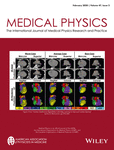
MEDICAL PHYSICS
Exploring Innovations in Medical Imaging and TreatmentMEDICAL PHYSICS, published by WILEY, stands as a leading journal in the fields of biophysics, medicine, and radiology, boasting an impressive impact factor and classified within the prestigious Q1 category across multiple relevant domains. With its ISSN 0094-2405 and E-ISSN 2473-4209, the journal has been a vital resource since its inception in 1974, leading the discourse well into 2024. Hailing from the United States, MEDICAL PHYSICS serves a diverse academic audience, comprising researchers, clinicians, and students eager to engage with the latest advancements and methodologies. The journal’s authoritative presence is underscored by its Scopus rankings, placing it among the top percentile in both Medicine and Biophysics, marking it as an essential scholarly platform for innovative research and critical reviews. While not currently an Open Access journal, its commitment to curating high-quality articles ensures that readers can access groundbreaking insights into medical imaging, treatment protocols, and the theoretical underpinnings of medical physics. Explore the intersection of technology and healthcare through the esteemed pages of MEDICAL PHYSICS.